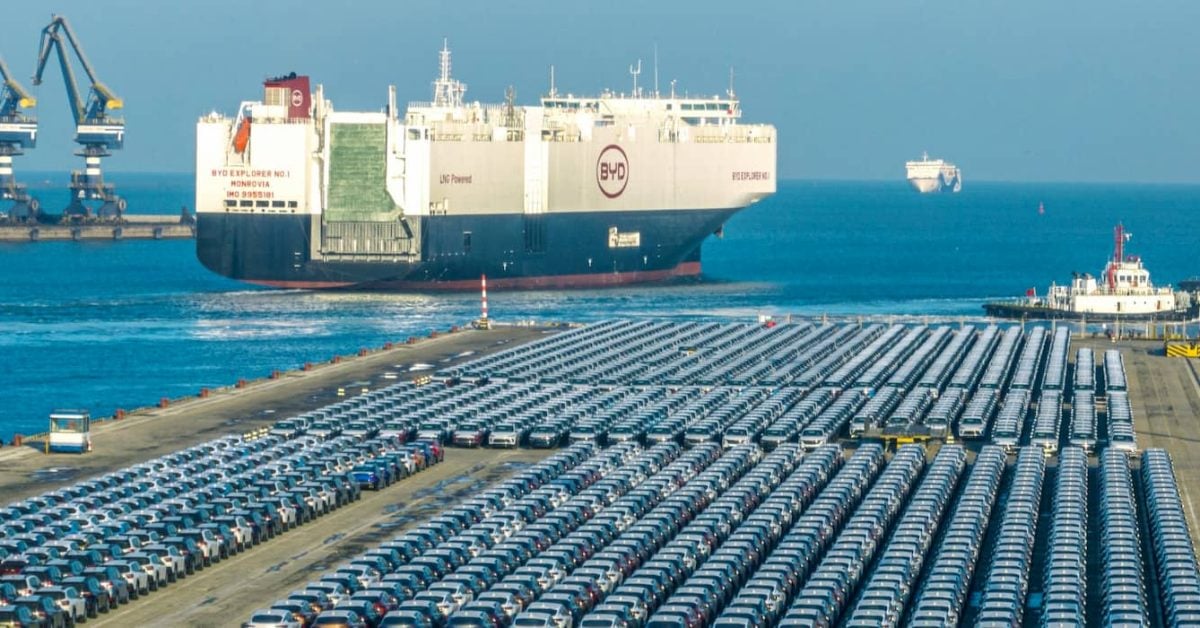Chinese automakers are aiming to more than double their full-process manufacturing capacity outside of China, all in hopes of beating out import tariffs on Chinese-made vehicles and meeting demand for EVs, according to a report from Bloomberg.
Bloomberg reports that Chinese carmakers are set to boost annual production capacity in foreign plants from 1.2 million vehicles in 2023 to more than 2.7 million by 2026.
As the US, the European Union, and Turkey are set to impose tariffs, Chinese companies are pouring tons of investments into full-process manufacturing – which involves all four major steps in auto production, from stamping, welding, painting, and final assembly, according to the report. While expensive to build, it has high-production capacity compared to knock-down assembly, where key parts of cars are made in China, for example, and then shipped overseas for assembly.
“As the electric vehicle market in China saturates, increasing domestic competition and overcapacity are pushing Chinese EV brands abroad in search of new growth markets,” Bloomberg said in the report.
In total, Chinese automakers have built full-process manufacturing plants in nine countries, with an annual production capacity of 1.2 million vehicles as of 2023. But that will double to 2.7 million units over a dozen countries by 2026 “if company announcements are all delivered on time,” Bloomberg reports.
BYD along with Chinese state-backed Chery, Changan, GAC, and SAIC have announced 10 new or expansion projects for their overseas plants, namely in Thailand, Indonesia, and Brazil, from 2023 to the end of August. Of course, China automakers are expanding all over the world, with BYD and Geely-owned Volvo driving the expansion in Europe. BYD is building a plant in Hungary with another announced for Turkey, which gives it access to the EU. Spain, Italy, and Poland are pursuing investments, with Geely, Dongfeng, and Xpend reportedly looking for locations for future plants in Europe.



This is a great example of how to beat tarrifs/ why tariffs don’t work. Charge double for my goods? Fine, I’ll just scale to produce them at half the price and there will be literally no-where you can sell your goods, and mine will still be cheaper in your local markets.
If it is causing manufacturers to produce the goods in the foreign country’s domestic market, then that would be a benefit to imposing tariffs. The country that is imposing tariffs gets to benefit from the spending on labor inside their own country, as well as corporate taxation for domestically produced goods, and finally for the increase to GDP which again goes to the tariff imposing country.
The whole point of the article is that basically China can overcome tariffs by focusing on overcapacity. In that scenario, the result of tarrifs isn’t any new labor for your country, and higher prices. The country imposing the tariffs gets the worst of both worlds.
I don’t think you read the article or you have poor reading comprehension. The word “overcapacity” appears exactly one time in the article and it is cite as a reason China is expanding to create manufacturing in foreign countries.
Producing more vehicles doesn’t automatically reduce the costs associated with building the vehicles since they do need to pay for all the materials, labor, and factories to build them. The article may make that claim but that doesn’t make it true and the countries listed in the article aren’t even countries imposing tariffs AFAIK. Brazilian built vehicles aren’t going to be rolling around the streets in the US for example nor will vehicles built in Thailand be hitting dealerships in the EU. The vehicles produced in these countries will be sold in these same countries. I don’t even see any relation here between US/EU tariffs and these new factories.
Actually I think this is showing the opposite, it’s forcing the manufacturing out of China, which is really the desired output (in my opinion).
Look at Toyota in the US, they are sometime more American made than local brands. By forcing the manufacturing outside of China you actually reduce dependency on China.